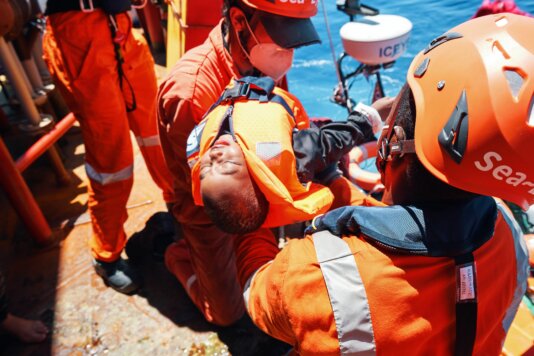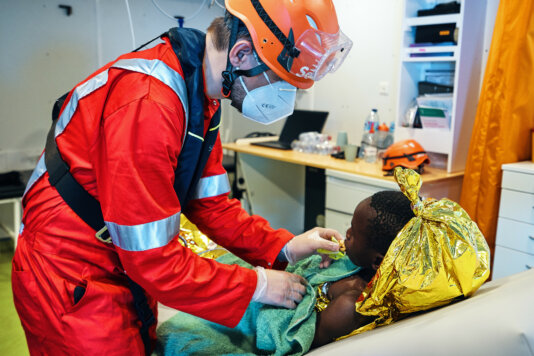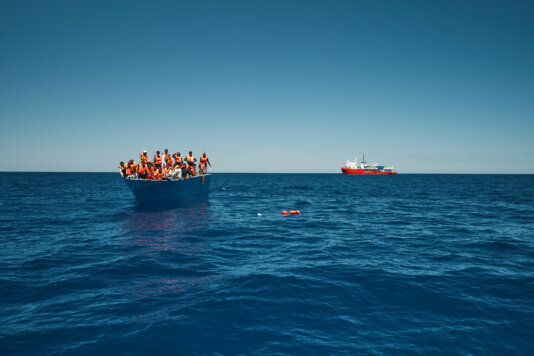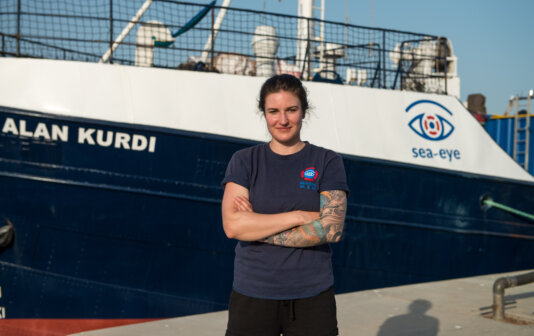- About
- Topics
- Picks
- Audio
- Story
- In-Depth
- Opinion
- News
- Donate
-
Signup for our newsletterOur Editors' Best Picks.Send
Read, Debate: Engage.
| June 16, 2021 | |
|---|---|
| topic: | Refugees and Asylum |
| tags: | #NGO, #migration, #Mediterranean migration crisis, #Libya, #EU |
| located: | Libya, Italy, Germany, Syria, Mali, Sudan |
| by: | Magdalena Rojo |
Nimet (a pseudonym) was six months pregnant when the Sea-Eye 4 vessel pulled her out from a wooden boat in the Mediterranean. It was one of five boats full of fleeing people that the Sea-Eye 4 encountered within less than 24 hours in mid May. Altogether, the vessel saved people from six boats. Most saved refugees and migrants were from Mali, Eritrea, Sudan, Syria and Egypt.
After the rescue, doctors aboard the Sea-Eye 4 attended to Nimet; she and her baby were doing well. Like other migrants and refugees, Nimet also spent the following four nights aboard the rescue vessel. "When she saw us working, she said, with tears in her eyes, that she also wanted to help people," Cincurova, one of 23 crewmembers of Sea-Eye 4, told FairPlanet. Cincurova joined the crew as a journalist, but was also receiving rescued people aboard the vessel.
On its recent mission, Sea Eye cooperated with other organisations. "Alarmphone is one of the organisations that signals to ships like ours where boats are sinking. People from the boats call them via satellite phone and they signal their location to us. After that, we try to find them, which is sometimes very difficult, because regardless of whether their engine works or not, the ship is moving at sea," Cincurova told the Slovak magazine fjuzn.
The boats that carry migrants across the Mediterranean Sea are usually wooden. "They are quickly assembled. They are very unstable and have a very low deck beneath the water surface, so people are often [crammed] inside the ship and there are just a few little holes that they can use to climb up,” Sophie Weidenhiller, a rescuer from Sea-Eye 4, told FairPlanet. “This can be very dangerous,” she continued, “When the boats are leaking, the water gets inside where there are people sitting, sometimes with the mixture of fuel leak and urine. You can suffocate, you can get chemical burns."
Weidenhiller was among the crewmembers who pulled refugees out of the overcrowded boats. They found them on a Central Mediterranean route, close to the Libyan coast in international waters.
Rescuers from Sea-Eye 4 found water in all six boats. Some refugees were wet, others dehydrated, and many, including children, were showing signs of hypothermia; they had injuries and infections from their stay on the boats. "Firstly, those who needed saw the doctor. If they did not need medical care, we gave them rescue blankets to put underneath their clothes around vital organs and around their heads. We delivered water and food to everybody," Cincurova said, describing the scene aboard the vessel until saved refugees and migrants disembarked in the port of Pozzallo in Sicily.
Out of 150 rescued minors, 19 of them were younger than 12. According to Weidenhiller, around 80 percent of minors were unaccompanied. "Some kids were accompanied but not necessarily by their parents. It was especially sad to see these young kids without their parents. We can see that this is an act of desperation. Parents would never deliberately risk the lives of their children if they thought that staying in Libya was safer than going on these boats," the rescuer suggested.
According to Weidenhiller, many of the rescued migrants and refugees stated that they knew they could die on the sea, but they preferred that to staying in Libya. International organisations report torture and abuse of migrants and refugees in detention centers in the country. Women also report rape cases.
Despite this information, thousands of migrants and asylum seekers have been pushed back to Libya by the EU-funded Libyan Coast Guard. The official statistics of what happens to these people are hard to obtain since the Libyan authorities do not have any official database.
In the past, the UN had charged members of the Libyan Coast Guard for being linked to smuggling and trafficking of migrating people. Moreover, according to an investigation done by The New Humanitarian (TNH), "[T]here is little distinction between criminal groups, militias, and other entities involved in EU-supported migration control activities under the GNA.” The GNA is the internationally recognised government authority in the country.
UN agencies for migration, such as IOM and UNHCR, have also been criticised for cooperation with the Libyan Coast Guard, which is known for committing human rights violations. The EU is funding the activities of these agencies in Libya through its EU Emergency Trust Fund for Africa.
In 2021, more than 28,300 people arrived by sea to Italy, Malta, Spain, Cyprus and Greece. There have been 813 deaths of migrants recorded in the Mediterranean so far this year. "We have to assume that more people have died than what we have a record of," Weidenhiller warned.
While the EU is funding criticized push-backs by the Libyan authorities, Sea-Eye 4 was one of very few European organisations that went on a rescue mission in the Mediterranean Sea in May.
Weidenhiller explained that assisting fleeing people has become more difficult for NGOs. "We used to just go out, assist people, rescue them, bring them back to port and go back to the sea. But now, there has been criminalisation of sea rescuing where people would get to court (for assisting refugees)," she stated.
“They try to prosecute us. There are detentions of ships. If the ship comes to the port, there is an inspection (by the European authorities) which is not done very often, but all the time with NGOs. Inspectors always find reasons to keep us in port for as long as possible.”
For example, one of the previous vessels of Sea-Eye, Alan Kurdi, spent months in a port at one occasion due to such an inspection. In case of the Sea-Eye 4, after the last successful mission, all the crewmembers of the vessel had to quarantine themselves aboard for 10 days even though all the tests for Covid-19 were negative.
Weidenhiller urges the EU to let rescuers work without any detentions or blocking. "The EU needs to start its own rescue mission but not only to protect borders but to actually save lives," she stated.
Image: Sea Eye / Guillaume Duez.




By copying the embed code below, you agree to adhere to our republishing guidelines.
